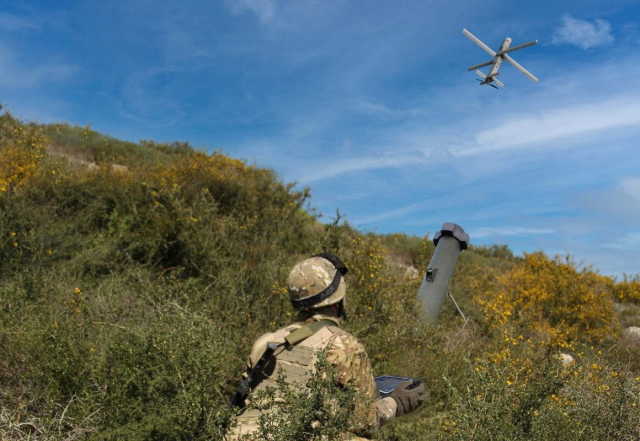According to official representatives of the German Rheinmetall arms concern, the company's management sees significant potential in expanding its product range through the field of so-called barrage ammunition. To this end, on November 11, 2021, the concern entered into strategic cooperation with the Israeli manufacturer of this category of precision weapons, uVision Air Ltd.
As you know, barrage munitions (BB) are unmanned aerial vehicles (UAVs), or kamikaze drones. They can be launched without the exact coordinates of the target, and then circle (barrage) over the area for a long time until the target is detected and attacked. In addition to defeating enemy combat formations, BB can also be used for aerial reconnaissance.
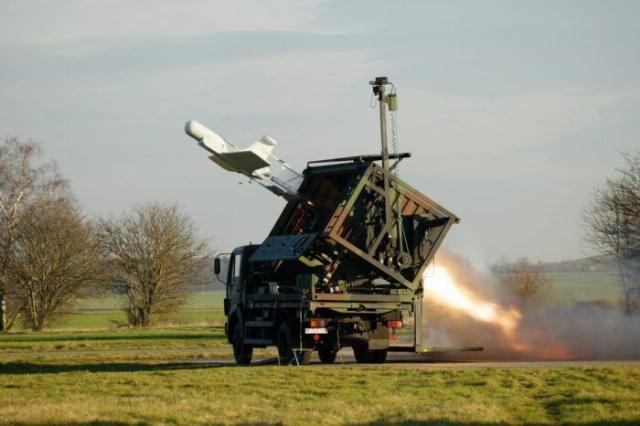
The KZO launch UAV is an element of the WABEP complex
About 10 years ago, with the support of the Bundeswehr and in cooperation with the Israeli state-owned company Israel Aerospace Industries, German engineers already conducted extensive demonstrations of the WABEP complex. The latter was characterized as an "effective system for remote destruction of single and point targets" and consisted of a KZO target designation reconnaissance UAV interacting with each other (more details here [...] ) from Rheinmetall and the Israeli Harop BB. According to the developers, KZO carried out reconnaissance of targets, and "Harop", then hit them with high accuracy. Although the tests were recognized as successful, about five years ago the Bundeswehr terminated the program without explanation.
After the 2020 conflict in Nagorno-Karabakh between Azerbaijan and Armenia, the attitude towards BB has changed again. According to Rheinmetall experts, BB can be used both in low-intensity conflicts with various threats, for example, from the civilian population, and in high-intensity battles against an equal or even superior enemy. Today, no other means of armed struggle can simultaneously offer high accuracy, ease of use, and the ability to conduct reconnaissance, and the provision of kinetic effects at long ranges.
Rheinmetall management and their Israeli colleagues presented their plans on January 12, 2022 in Bonn, at a trade press conference held under the motto "Game changer on the battlefield – barrage ammunition systems". During the event, in addition to general views on BB partners, the design features and tactical and technical characteristics of the Hiro BB family (Hero, Russian - "Hero"), developed by uVision, were described in detail.
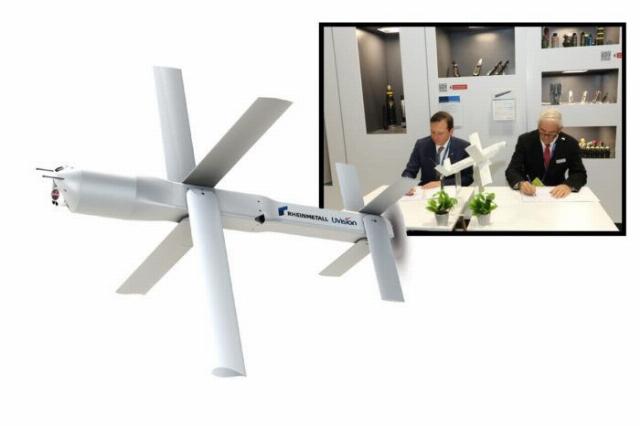
Rheinmetall and uVision sign a cooperation agreement
Barrage ammunition as a weapon
Rheinmetall experts stressed during the press conference that despite the fact that the general public in Germany learned about the existence of this type of weapon during the Nagorno-Karabakh conflict, BB has been widely used, and some of them have been used for decades. So, according to the director of sales and marketing of uVision, D.L. Ari (Dagan Lev Ari), the Israel Defense Forces used the first barrage ammunition back in 1982. BB systems form a separate category of weapons, combining the advantages of anti-tank guided missiles (ATGMs) and attack UAVs and eliminating, at the same time, their disadvantages.
Attack drones provide a long stay over the patrol area, but they are burdened with high acquisition costs and relatively cumbersome usage request processes. On the other hand, ATGMs are in service with companies and can be deployed quite quickly. However, to use them, you need to know exactly where the target is at the moment. In addition, their effective range is limited to a few kilometers.
In turn, depending on the characteristics of the BB system, they are able to hover (barrage) over the target from several minutes to several hours. They can also be guided into areas of barrage without direct visibility of potential targets and used there for reconnaissance. Additionally, the design of the systems may include the possibility of reusing ammunition, which pays off if it is not possible to detect worthy targets or their defeat must be interrupted for tactical or humanitarian reasons.
According to an Israeli expert, depending on the design of the BB, it can be divided into three categories. The first corresponds to a copter drone. Such systems take off vertically and, if necessary, land on their own again. Since young soldiers are often familiar with these types of drones, they learn them quite easily. These systems are capable of attacking targets vertically from above, preventing them from hiding behind obstacles. In addition, the ability to hang in place or wait on the roofs of buildings determines the use of such systems in conditions of dense development. The disadvantages of such systems include, among other things, a relatively clear acoustic signature, which facilitates their detection. Since both thrust and maneuverability are provided exclusively by screws operating at very high speed, the designs of such devices are characterized by an appropriate size. Other disadvantages are low speed and short flight time (less than an hour). Thus, both the barrage time and the flight range of such a BB-copter are limited. Among other things, their susceptibility to wind is high.
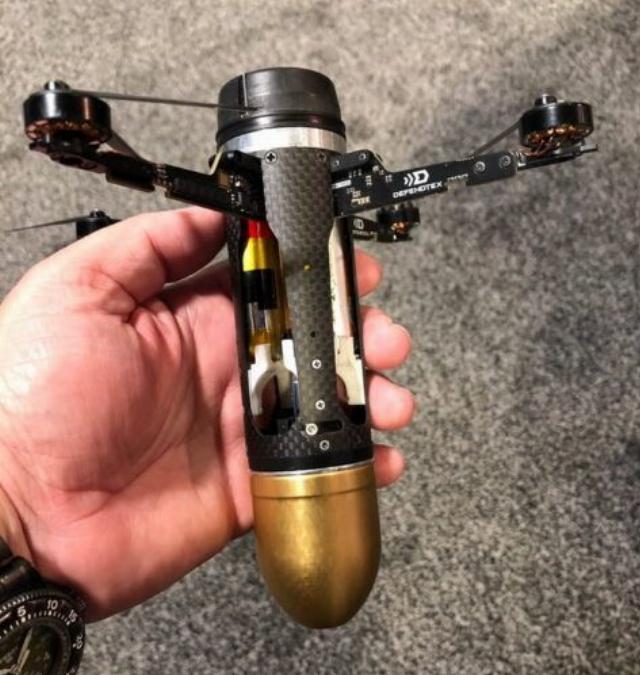
BB-copter Drone-40 from the Australian company DefendTex
The second type corresponds to the design of a classic airplane-type UAV. It is associated with long flight times and ranges. The optical and acoustic visibility of this type is relatively low. However, due to the aerodynamic design features, such BB systems can only attack targets at a flat angle. For this reason, obstacles and shelters in the immediate vicinity of the target make it possible to prevent BB attacks. Depending on the method of return, reuse of this type of system is also limited (possibly if a parachute is used for return).
The third variant of barrage ammunition is based on the typical design features of guided missiles. However, instead of rocket engines, they are equipped with larger X-shaped wings and screw drives. With such designs, both longer barrage times and ranges in the target area, as well as steep angles of attack, can be implemented.
Hero Family Barrage Ammunition
When creating the Hiro (Hero) BB family, uVision used a design principle close to the design of guided missiles. The Hiro series of remotely controlled precision-guided munitions is designed to defeat a wide range of targets. Ammunition has a short, medium and long range and flight time, and also allows the use of various types of combat units (warheads).
The systems can be used independently of or based on a combat platform. The Hiro system includes an appropriate launcher, ammunition and control unit, as well as a ground data terminal. The systems offer users combined capabilities for reconnaissance and destruction. They allow you to detect, track and hit inconspicuous targets whose condition and position are time-sensitive.
The BB "Hiro" family of uVision includes several models presented in the table:
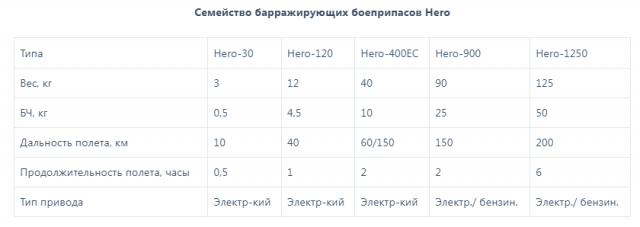 |
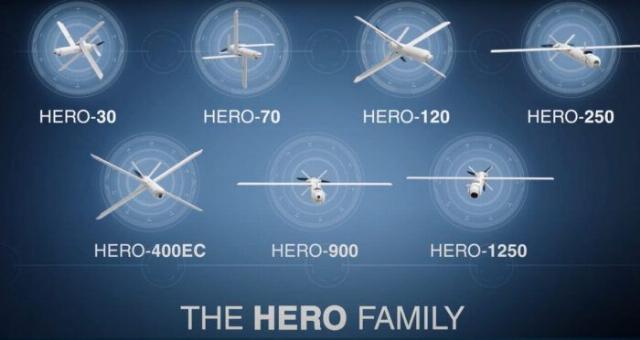
The Hero family of barrage ammunition
According to L. Ari, the Hiro family was developed from scratch as affordable high-precision ammunition, convenient for use by ordinary military personnel. According to the manufacturer, the Hiro systems are much closer to guided missiles than to drones. The ammunition concept is characterized by an affordable price and the ease of operation and operation of the system, which can be safely used under stress conditions. Thus, with performance characteristics comparable to modern NATO ATGMs, the Hero-120 model allows hitting various targets, including main battle tanks, at a range of up to 40 km. At the same time, the weapon has low optical and acoustic visibility, which makes it difficult to detect and counteract it, and the price of BB is about 60% of the cost of modern Western-made ATGMs.
To detect and track a target, uVision BB is equipped with a combination of a day vision camera and a thermal imager, which allows not only to hit targets during the entire flight time, but also to highlight ("highlight") them for other means of destruction. In addition, the installation of optical sensors makes it possible to defeat the target regardless of the reception of GPS signals.
Other advantages of the BB "Hiro" family include the manufacturer:
- Pneumatic start using compressed air that does not generate smoke or acoustic signatures. At the same time, there is no plume of smoke that allows you to track the launch site.
- The possibility of reuse, thanks to the landing of the product on a parachute. However, repeated use requires replacement of the battery, inspection and re-installation of the parachute by personnel with appropriate training.
- Simple and intuitive operation.
- The possibility of using it as a means of intelligence.
On the subject of BB of the Hero family:
- Barrage ammunition of the Hero family. Conclusion
- Kamikaze drones HERO-90 and VIPER at the Paris Air Show 2023
Based on the materials of the resource soldat-und-technik.de
